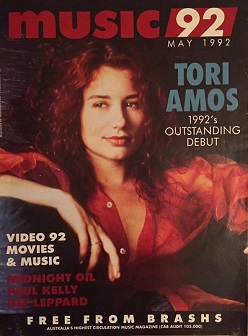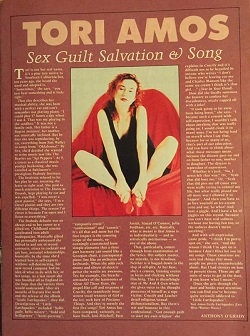|

songs | interviews | photos | tours | boots | press releases | timeline
Music 92 (Australia)
May 1992
 
TORI AMOS
Sex, Guilt, Salvation & Song
by Anthony O'Grady
Tori is not her actual name, it's a pine tree native to Southern California but, ten years ago, she heard the word and adopted it.
"Sometimes," she says, "you just hear something and it feels right."
That also described her musical ability, she was born with a perfect ear and can't remember not playing piano. "I could play 17 hours a day when I was 4. That was my playing in the sandbox." It was not a family trait. Her father is a Methodist minister, her mother not musically inclined. But by four she was reproducing, by ear, everything from Fats Waller to songs from Oklahoma!. By five, she'd decided she wanted to write music just like The Beatles on Sgt. Pepper's. At 9, a career as a classical music prodigy beckoning, she was enrolled at Baltimore's prestigious Peabody Institute.
The Institute refused to let her play by ear, insisting she learn to sight read. She paid as much attention to The Doors as Dvorak, kept playing by ear and was expelled. "I was never a great pianist," she says, "I'm a clever pianist and they are two different things. The reason I'm clever is because I'm open and I listen to everything."
The Peabody debacle was an abrupt end to her career as a gifted tot. Childhood trauma accelerated into adult inadequacies. Musically gifted but personally unfocused she drifted in and out of record contracts, stints in cocktail and gay bars, personal relationships. Ironically, by the time she'd learned how to self-express without self-destructing, her new record company had no idea what to do with her, or her songs. As a last resort she was bundled off to England in the hope that the natives there would understand. After six months of bravura live work and teh release of the album Little Earthquakes, they did. Descriptions of Little Earthquakes included "hello guilt, hello misery," "bold and belligerent," "heart-piercing," "rampantly erotic," "confessional" and "cosmic". It's all that and more but the first impact is the towering scope of the music, so cunningly constructed from simple elements that a three part harmony can sound like a Georgian choir, a contrapuntal piano line like an orchestra of keyboards. When she adds rock drums and slivers of electric guitar the results are awesome. Try, for example, the breathy sensuality of the harmonies of "Silent All These Years," the gospel-like call and response of "Crucify," the seamlessly interwoven vocal textures of "Girl" or the icy, rock fury of "Precious Things." And they're merely the first five songs! Tori Amos has been compared, variously, to Kate Bush, Joni Mitchell, Patti Smith, Sinead O'Connor, Julia Fordham, etc, etc. Basically, what is meant is that Amos is as individualistic -- and as artistically meritous -- as any of the above.
That, particularly, comes through from examination of the lyrics. Her subject matter, no mistake, is not frivolous. Neither is it bogged down in the slop of self-pity. At her best, she's a camera, framing events in focus and clicking without flinching. This is disturbingly true of "Me and a Gun" where she gives voice to the thought processes of herself as a rape victim. "Crucify" and "Leather" detail religious/secual disfunctionalism. But there's wit and humour in this confessional. "Got enough guilt to start my own religion" she explains in "Crucify" and it's difficult not to be beguiled by anyone who writed "I don't believe you're leaving cos me and Charles Manson like the same ice cream I think it's that girl..." ("Tear in Your Hand").
How did she finally summon the bravery to confess her disturbances, nicely capped off with a joke?
"It took going so far away from being brave," she says. "I became such a coward with self-expression, I wouldn't talk about anything that was really going on, I would cloak it in many ways. I'm not being hard on myself when I say that, because for so many of us, that's part of our education. And you have to think about what those messages mean, because the disease goes on and on from father to son, mother to daughter. The disease is repression of expression."
"Whether it's just, 'No, I never felt that way.' Or, 'Yeah, that did hurt me.' Or, 'Yeah, that did piss me off 'cause you were really trying to control my life, but what really pissed me off more was I allowed it to happen.' And then you have to go buy yourself an ice-cream cone and say, 'So what?' And have a giggle. And I have a lot of giggles on this record. Because you can't have real sadness without having fun too, or the sadness doesn't mean anything."
And with self-expression came pride. "I think I'm pretty spot on," she says, "and the reason I think I'm spot on is because I don't filter for you in my songs. These emotions are very real things that most people are pretty uncomfortable about. But I had choices on how I present them. There are all sorts of ways to get in the door, if you know what I mean."
Once she gets through the door and hooks your attention, you can find you've become quite seriously addicted to Little Earthquakes.
Tori Amos: Little Earthquakes (East West/Warner Music)
t o r i p h o r i a
tori amos digital archive
yessaid.com
|